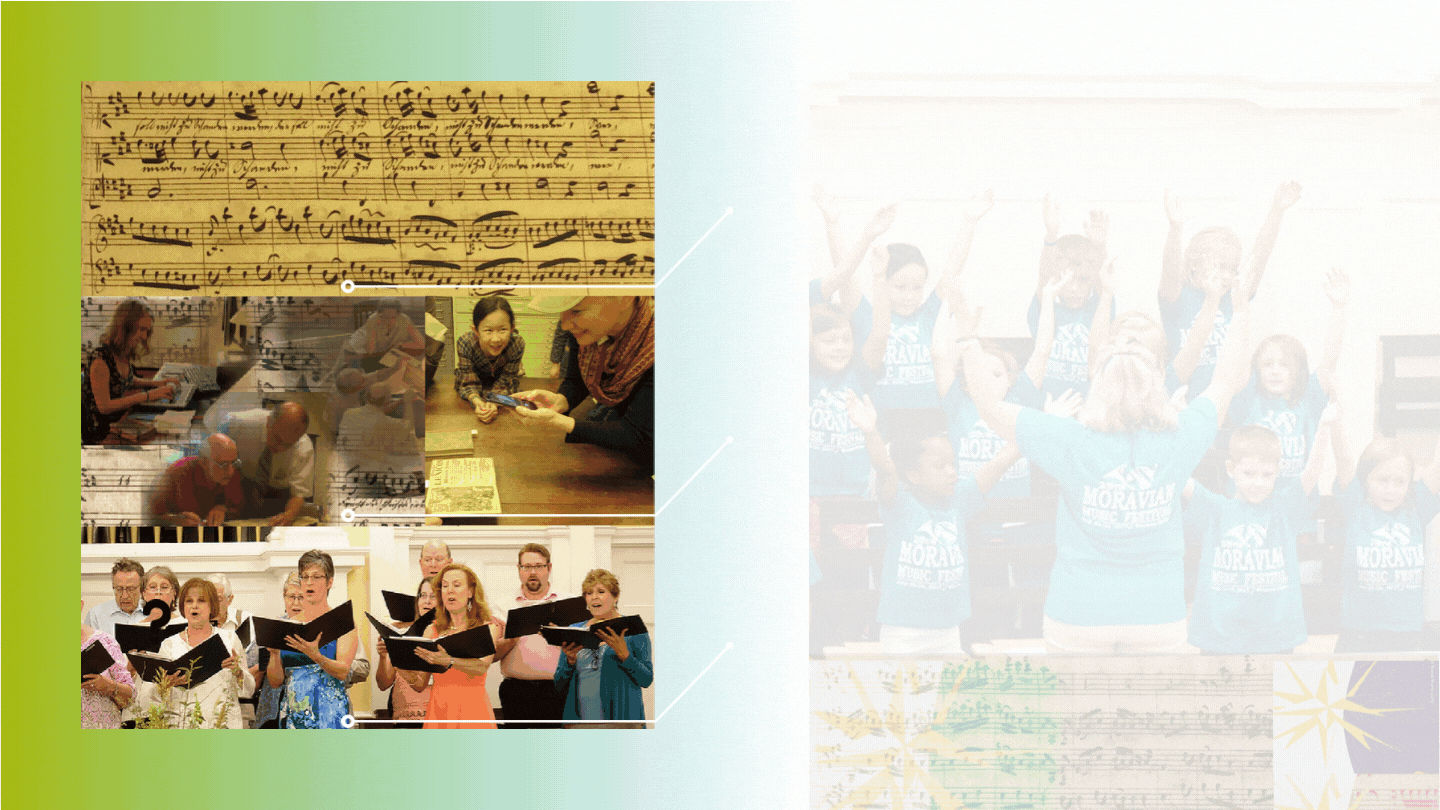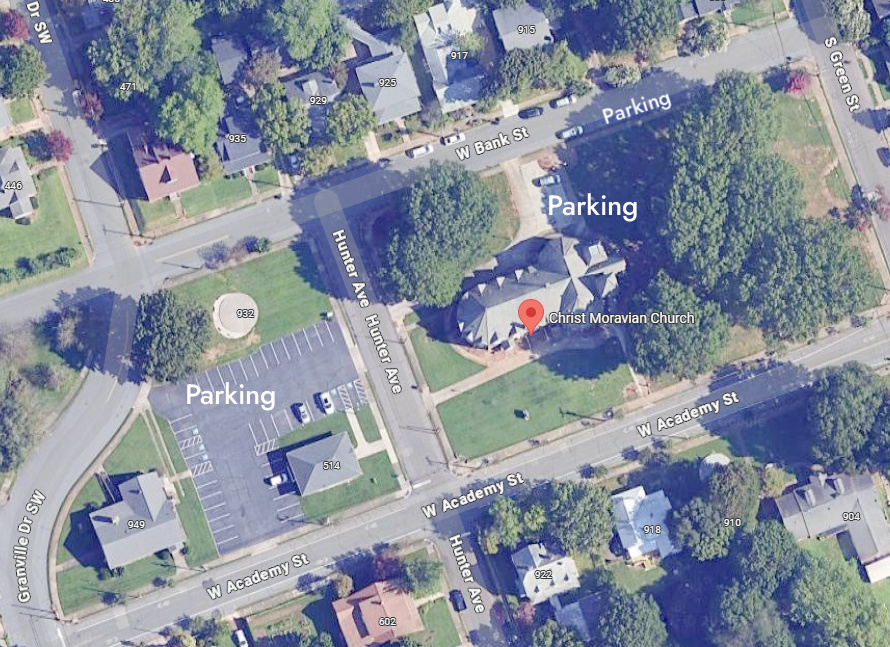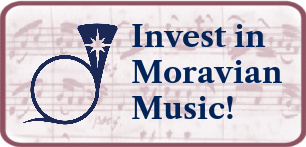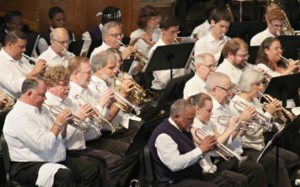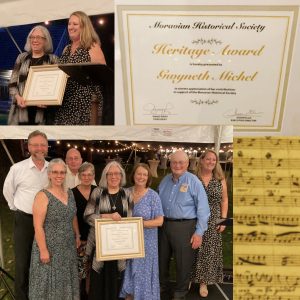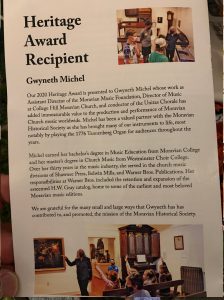Moravian music includes vocal, choral, and instrumental music, both sacred and secular, originating from
(or enjoyed by) Moravian churches and settlement congregations.
MMF holdings include collections of music, Moravian and non-Moravian,
from the sixteenth through the twenty-first centuries,
that was composed in North America, several European countries, and beyond.
Early Moravians composed some of the first American chamber music and crafted the earliest known string instruments and pianos. We celebrate John Antes, composer and luthier, and the enduring impact of David Tannenberg, early American organ builder. In the 20th century, the Moravian Music Foundation became, and remains, the driving force responsible for many first modern-day editions, performances, and recordings of music from the eighteenth and nineteenth centuries.
The composers of Moravian music throughout history have been primarily people with other vocations. Moravian composers of the 18th and 19th century were also pastors, teachers, and administrators, with responsibilities far beyond composing and directing music. These Moravian composers wrote very few pieces of independent instrumental music, though the Moravians used instrumental music extensively for instruction and enjoyment.
Among the most influential Moravian composers were:
John Antes (1740-1811), Pennsylvania-born instrument maker, missionary, and composer of the earliest known instrumental chamber music by an American born composer;
Johann Christian Bechler (1874-1857), German minister, one of the first professors at Moravian Theological Seminary, later elected bishop;·
Jeremias Dencke (1725-1795), German organist and composer of the earliest example of Moravian concerted church music in America;·
Johann Ludwig Freydt (1748-1807), teacher in Moravian schools, co-worker with Christian Latrobe;·
Johann Christian Geisler (1729-1815), German Moravian minister and member of the Unity Elders Conference;·
Christian Gregor (1723-1801), minister, organist, and church administrator and bishop; editor of the German Gesangbuch of 1778 and the Choralbuch of 1784, both highly influential for more than a century; ·
Johann Daniel Grimm (1719-1760), musician and teacher of Johann Friedrich Peter; compiler of the 1755 manuscript chorale book of almost 1,000 tunes;·
Francis Florentine Hagen (1815-1907), American Moravian teacher, pastor, and evangelist; ·
Johannes Herbst (1735-1812), bookkeeper, teacher, organist, pastor, bishop, headmaster of Moravian girls’ school in Lititz, Pennsylvania, and a prolific composer and copyist of other Moravian composers’ works;·
Christian David Jaeschke (1755-1827), descendant of early Czech immigrant family, teacher, organist, and copyist; ·
Christian Ignatius Latrobe (1758-1836), English Moravian missions administrator, and friend of Franz Joseph Haydn;·
Heinrich Lonas (1838-1903), organist and teacher, editor of a Moravian chorale book used in Germany;·
David Moritz Michael (1751-1827), German Moravian teacher and worker with the single brethren in Nazareth and Bethlehem, leader of Bethlehem Collegium Musicum and composer of wind ensemble music and sacred vocal works;·
Johann Friedrich Peter (1746-1813), pastor, teacher, music director, and composer of more than 80 sacred vocal works and 6 string quintets, possibly the earliest chamber music written in America; ·
Simon Peter (1743-1819), brother of J. F. Peter, pastor and church administrator;·
Johann Christopher Pyrlaeus (1713-1785), first Moravian musician to serve in Native American missions; organizer of first Moravian Indian-language school and translator of many hymns into Mohican language; established Bethlehem Collegium Musicum;·
The “Van Vleck sisters,” Amelia Adelaide (1835-1929), Lisette Marie Van Vleck Meinung (1830-1914); Louisa Cornelia (1826-1902), all teachers at Salem Female Academy and composers primarily of well crafted and sophisticated salon music for piano, voices, and guitar;·
Jacob Van Vleck (1751-1831), pastor and inspector of Bethlehem girls’ school, bishop and musician, grandfather of the Van Vleck sisters;·
H. M. H. Woldemar Voullaire (1825-1902), teacher and pastor of several European Moravian congregations, composer in the style of Brahms;·
and countless others who served the church through their musical abilities alongside their other vocations, including these and more:
Christian Ludwig Brau
Theodor Lily Clemens
Ernst Immanuel Erbe
John Gambold Jr.
Johann Gottfried Gebhard
Christian Gottfried Geisler
Christian Friedrich Hasse
Edward W Leinbach
James Montgomery
Georg Gottfried Müller
Abraham Ritter
Johann Christian Till
John Frederick Wolle
Peter Wolle
John Worthington
Moravian composers of today, much like their ancestors, may be full time or part time church musicians, but more often are people with other professions who serve God through music.
Approximately one-third of the archival holdings is housed at the Archie K Davis Center, 457 S. Church St., Winston-Salem, NC; two-thirds of the archival holdings reside in the Moravian Archives, Northern Province, 41 W. Locust St., Bethlehem, PA.
MMF Locations
~ MMF offices in Winston-Salem are in the Archie K Davis Center
~ MMF offices in Bethlehem, PA are in the Moravian Church Center
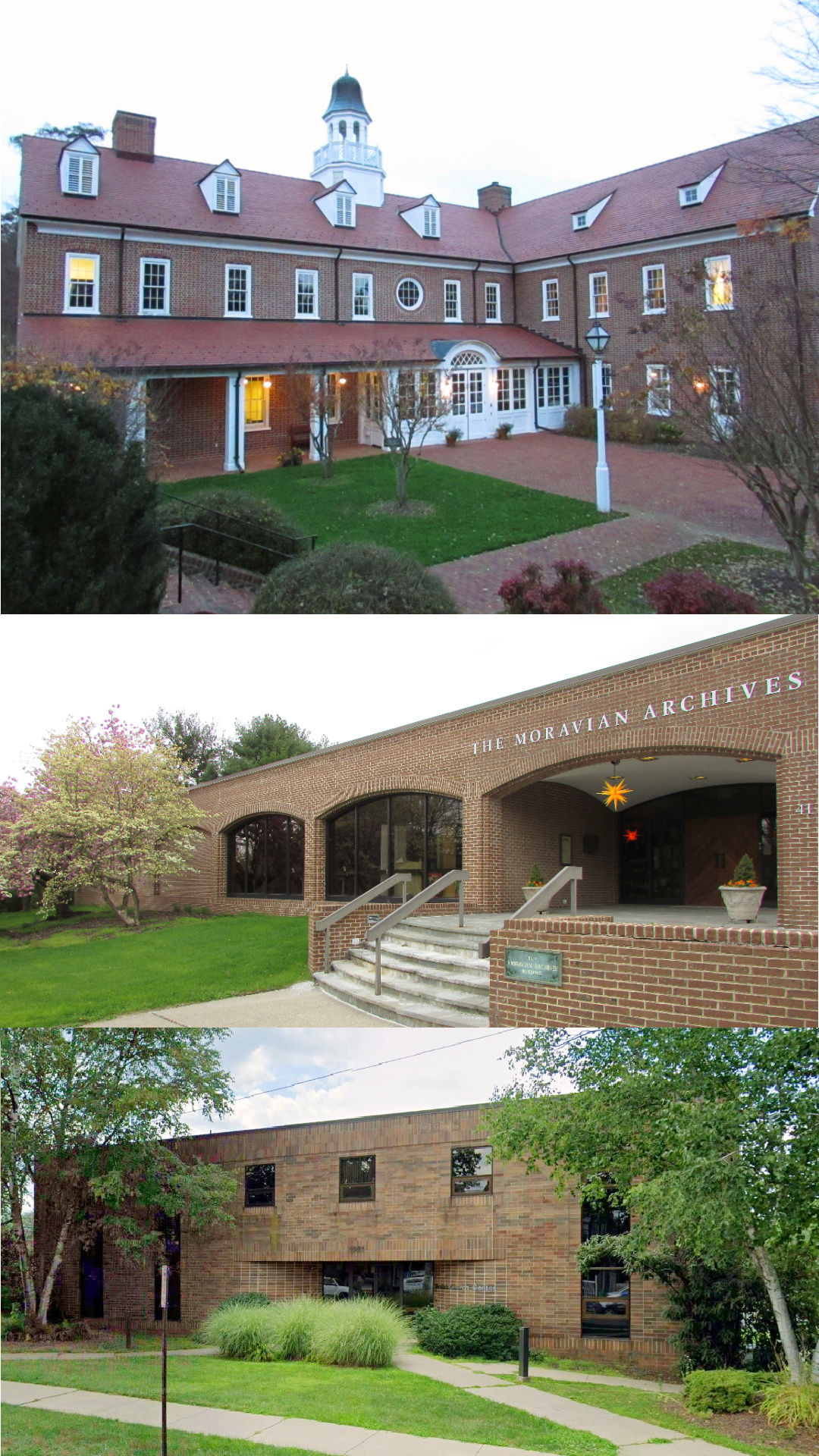
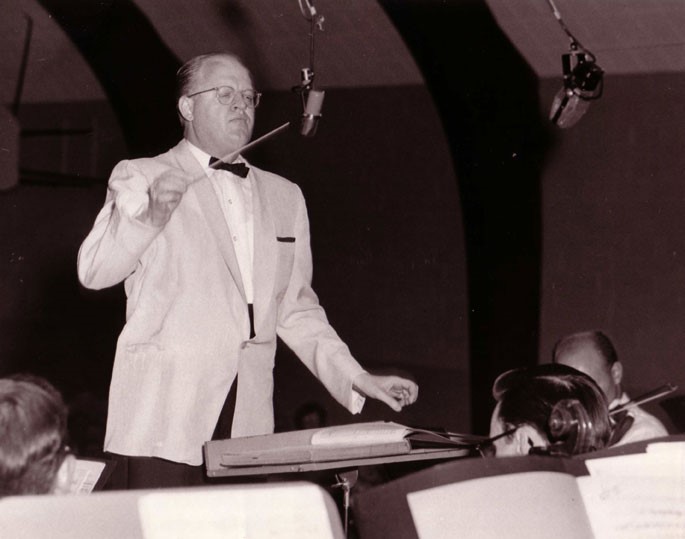
Thor Johnson initially received national attention as the youngest American born and trained conductor of a major American orchestra – the Cincinnati Symphony Orchestra. He later achieved international recognition and became known for his championing of contemporary music.
Thor Johnson’s Legacy
Champion of Moravian and American Music
Thor was born in Wisconsin Rapids, Wisconsin on June 10, 1913. His father was a Moravian minister, and when he was four years old, his father became the pastor of the Friedberg Moravian congregation south of Winston-Salem, North Carolina, one of the largest Moravian settlements in the United States. Thor immersed himself in Moravian music. His love of his church’s music informed much of his life. By the time he was in high school he played violin, viola, and French horn, and when only sophomore was made assistant conductor of the high school orchestra.
Thor studied at the University of North Carolina (1934) and the University of Michigan at Ann Arbor for graduate study. While there he came to the attention of Serge Koussevitzky, famed conductor of the Boston Symphony Orchestra, and he was awarded a full grant for a year of study in Europe, beginning in the summer of 1936. Living primarily in Leipzig and Prague, he studied with distinguished musicians, including Bruno Walter, attended concerts, and met many of the most important figures in the musical world.
In the fall of 1937, he was appointed to a full-time faculty position at the University of Michigan and began speaking of the importance of encouraging American artists. While at Michigan, Thor took over as director of the Grand Rapids Symphony Orchestra.
During World War II, Thor enlisted in the U.S. Army and directed various army bands and orchestras and had the opportunity to guest conduct the Philadelphia and the Chicago Symphony Orchestras. Upon his discharge in May of 1946, he joined the faculty of Julliard School of Music. In December of 1946, while at Julliard, Thor came to national attention when he was appointed musical director of the Cincinnati Symphony Orchestra, at age 33, following a list of great conductors like Leopold Stowkoski and Fritz Reiner.
In the early 1950s Thor founded two music festivals that have become synonymous with his name and that continue to thrive. They are linked by Thor’s devotion to Moravian Music. The first, the Early American Moravian Music Festival & Seminar in 1950 in Bethlehem, Pennsylvania, following several years of research and discovered treasures in the Moravian Archives. The last one he directed was in DePere, Wisconsin in 1974. The festivals cater to church musicians but also expose Moravian music to a wider audience.
The second major festival founded by Thor is the Peninsula Music Festival in Door County, Wisconsin helped along by Lorenz Heise, a businessman from Milwaukee and summer resident of Door County. The first concert featured what would become Thor’s hallmark—the premiere of an original work composed for the Peninsula Music Festival. Thor came to love Door County and built a summer home on the shore of Green Bay.
In 1958 Thor left the Cincinnati Symphony Orchestra and accepted a position as full professor and Director of Orchestral Activities at Northwestern University in Evanston, Illinois.
Thor accepted the job as Director of the Interlochen Arts Academy and conductor of its orchestra in 1964. After three successful years at Interlochen, he left to become the musical director of the Nashville Symphony Orchestra and continued his tradition of premiering new music.
On January 16, 1975, at 61 years of age, Thor Johnson died as the result of complications from surgery to remove a brain tumor.
In the words of his biographer …
“…by the countless audiences who had been touched and blessed by his music, the thousands of orchestra members, and choral singers whom he instructed and inspired to bring this music to life, and the hundreds of young musicians he encouraged, nurtured, and helped with unselfishness and joy.”
from Thor Johnson, American Conductor by Louis Nicholas,
Historical Timeline of the Moravian Music Foundation
